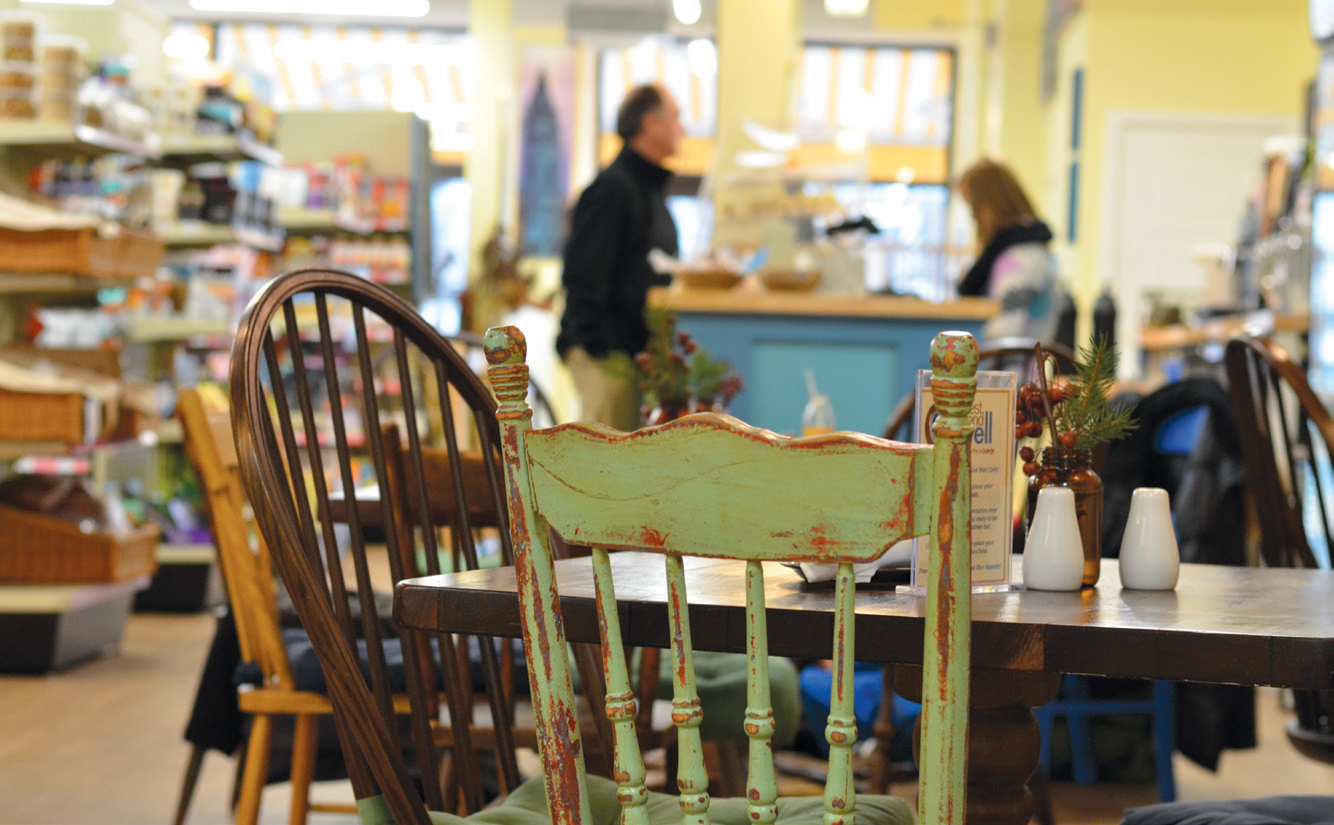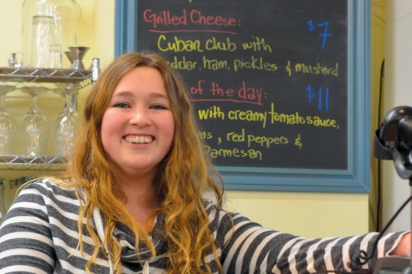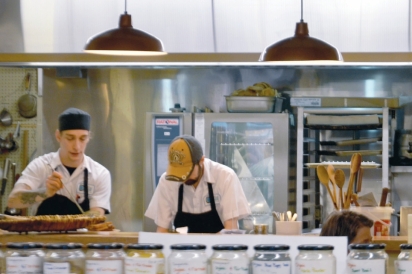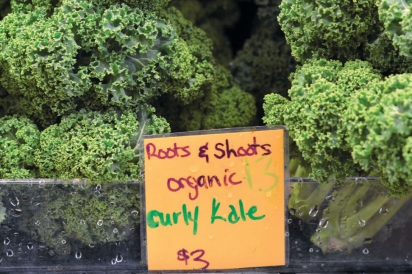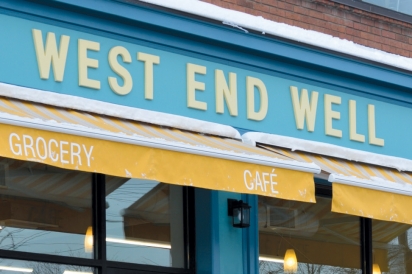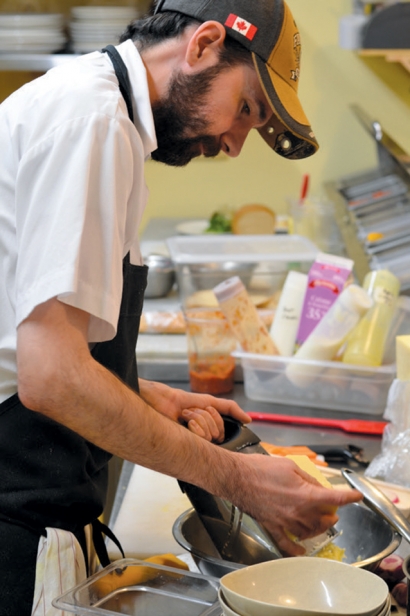Warming Up at the West End Well
Picture this: Emerging from a snow-laden sidewalk and entering a cozy café where other diners smile and nod as you await the chef’s creation. This time, it’s a steaming bowl of soup made from seasonal, organic, root vegetables and herbs, complemented by a glass of Ontario wine. Beside you there’s a small, but well-stocked, grocery section and a library of books on environmental topics; upstairs, a meeting room for workshops on local and global food issues. Posters near the cash register advertise cooking and wellness classes, music and storytelling events and film nights. All of this under one welcoming roof.
That roof belongs to The West End Well, Ottawa’s new co-operative café and grocery on Wellington Street West. Not only is it a place to find local food; it’s also a source for inspiration on sustainable living. It all fits within the West End Well’s motto, “nourishment for a change,” the “change” being a transition to a more sustainable and just society. The Well’s creators, many of whom knew each other through the grassroots network Sustainable Living Ottawa West, wanted a place where people could gather to share food and ideas.
“The fundamental thing that we’re anchoring ourselves on is supporting a community finding the nourishment within itself for a full and vibrant life — finding the food here, but also the learning, the connections, the cultural experiences,” explains Bill Shields, West End Well’s co-founder and board chair.
As a co-operative, the West End Well is owned by its members. A lifetime membership is $50, with flexibility for people who can’t afford the fee. Anyone can shop at the co-op without having a membership. By December, upwards of 600 people had signed up as members.
“There’s something about the concept, I think, that struck a nerve,” says Shields. “[People] see that they can get together and do something.”
The Well’s founders had little difficulty raising $1.6 million in community financing to purchase a building, and another $400,000 in RRSP-eligible preference shares to launch operations.
The Well is committed to keeping prices affordable and paying food producers fairly. Its design is based on permaculture principles. For example, if produce isn’t selling in the grocery, it’s not discarded; instead, the Well’s kitchen transforms it into soups, stir-fries or jams. Multipurpose rooms use space efficiently: grocery shelves move out of the way to expand the 30-seat café into a 60-seat performance venue.
The Well also benefited from the existence of the Local Organic Food Co-op network, which supports and connects food and farming co-ops in Ontario. Launched in 2009, the network now boasts 70 members. “There’s been a real resurgence of food co-ops in Ontario in the past seven or 10 years,” says Shields. He adds that the other co-ops were “generous” these other co-ops were in sharing information on financial models, storage equipment and other operational needs.
The Well sells produce, packaged and bulk goods, frozen foods, take-home meals and more. “Overall, we have a little bit of everything. You can basically find everything you need,” says Steph Kittmer, the Well’s grocery manager, who brings farming and marketing experience, as well as graduate degrees in environmental studies and political economy, to her role.
The Well gives priority to providing food that is local and organic, purchased from producers in Ottawa, the Ottawa Valley, Quebec, eastern and southern Ontario and further afield when necessary. Food that isn’t local is organic and fair trade when possible. “We do carry things that are not local, like bananas, lemons and limes, because there’s a market for them,” says Kittmer.
In winter, the grocery and kitchen rely on nearby farms such as Roots and Shoots, Roots Down Organic, and Bluegrass Farm, all of which have greenhouses or storage facilities that can supply vegetables and leafy greens year round. The kitchen also draws on a small stock of foods that staff froze or preserved last fall.
On the shelves, you’ll find other local delights, including Harvey & Vern’s soda, A Country Garden honey, Hummingbird chocolate, Equator coffee and Tealee teas. There’s Voltigeurs chicken, O’Brien and Fitzroy beef, and Seed to Sausage meats. The cheeses are from Empire, Canreg Station and Zengarry, to name a few. Kittmer cites dozens of other examples, then laughs. “It’s so hard — you can’t make a list. People just have to come in and see it.”
The West End Well’s kitchen serves up seasonal fare, using local ingredients where possible. For chef Sam Robertson, winter means warm, nourishing, seasoned or spicy foods, and daily specials that take advantage of what local farmers have available and allow the staff to try new combinations.
Robertson, who has worked internationally and across Canada, prefers simple, fresh, healthy food with a twist. “I like that there’s been this return to — I’ve heard it called different names but “nonna” cuisine or “grandma’ food”— that’s the food that I think people most crave.”
For staff and customers alike, the Well offers a sense of community, from the open kitchen where the chef engages with diners, to the “community living room” feel. It’s a place where people can enjoy warm food, a friendly atmosphere and the knowledge that they’re supporting a more sustainable community.
West End Well Co-op
969 Wellington St. W, Ottawa ON
WestEndWell.ca, 613.725.0505


